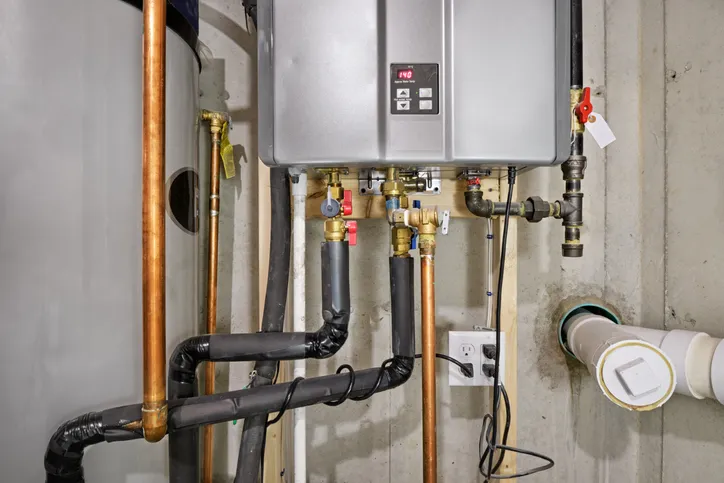Water Heater Installation in Agoura Hills, CA
Serving Ventura & Sacramento Counties

A reliable water heater is essential for comfort in Agoura Hills homes—hot showers, clean dishes, and steady laundry performance depend on it. Whether you’re replacing a failing unit or upgrading for better efficiency, a professional water heater installation in Agoura Hills, CA ensures the right size, fuel type, and safety features for local conditions like seismic risk, hard water, and California energy rules. This page explains what to expect during selection and installation, common local issues, warranty considerations, and maintenance and efficiency upgrades that protect your investment.
Common water heater problems Agoura Hills homeowners face
- Sediment buildup and reduced capacity from mineral-rich Southern California water
- Corrosion and leaks in older tanks, often after 8–12 years
- Frequent pilot outages or failed heating elements in electric models
- Inefficient operation and high energy bills from undersized or outdated units
- Seismic vulnerability and poor drain/overflow pan setups in hillside properties
Understanding these common failures helps you choose the right replacement and avoid repeat service calls.

Types of services and installations
- Conventional tank water heater installation (gas or electric): straightforward swap of like-for-like units or a size upgrade
- Tankless (on-demand) water heater installation: space-saving option with higher up-front cost but longer life and lower energy use
- Hybrid/heat pump water heater installation: electric heat pumps that use less energy for suitable homes
- Conversion projects: switching fuel types (e.g., electric to gas) or upgrading venting and gas lines
- Seismic bracing, drip pans, and overflow drain installations required for code compliance and property protection
Tank vs tankless — which is right for your Agoura Hills home?
- Tank water heaters
- Best for predictable demand and simpler installation
- Typical capacities: 30–80 gallons; choose based on household size and peak-hour demand
- Pros: lower initial cost, easier maintenance; Cons: standby heat loss, shorter lifespan
- Tankless water heaters
- Rated by flow (gallons per minute, GPM); ideal for smaller households or homes that want continuous hot water
- Pros: longer lifespan (15–20 years), energy savings, space savings; Cons: higher installation cost, may need upgraded gas line or electric service
- Hybrid/heat pump water heaters
- Most efficient electric option where space and ambient conditions allow
- Pros: substantial energy savings in mild climates like Agoura Hills; Cons: higher upfront cost, require space and ventilation
Consider household hot water use (number of showers, laundry, dishwasher run times), space constraints, and whether you plan to reduce energy use or convert fuel types when choosing.
Sizing guidance (simple rules of thumb)
- For tank heaters: multiply number of full bathrooms by 20 gallons and add 20–30 gallons for kitchen usage; most 3–4 bedroom Agoura Hills homes end up with 50–80 gallon tanks.
- For tankless systems: calculate peak simultaneous flow (shower + shower + dishwasher) and choose a unit with GPM rating equal to or greater than that peak, accounting for temperature rise needed from local ground water temperature.
A proper load calculation is part of a professional installation estimate and avoids under-sizing.
Fuel type considerations for Agoura Hills
- Natural gas is common and cost-effective for high-demand households; check existing gas line capacity and venting needs.
- Electric is simpler to install but typically more expensive to operate unless you choose a heat pump model.
- Solar water heating is an option in Southern California’s sunny climate and can be paired with backups (gas or electric).
- Local utility rates, household usage patterns, and electrification goals should guide your choice.
Installation process — what a professional will do
- Pre-installation assessment: inspect location, venting, gas/electric connections, water quality, and necessary permits
- Permits and code compliance: secure local permits and ensure installation meets California and Los Angeles County requirements, including seismic strapping and proper drainage
- Safe removal: drain and dispose of the old unit per local regulations
- Mechanical and plumbing work: install new unit, update gas lines or electrical service if required, install expansion tank or mixing valve as needed
- Venting and combustion air: for gas units, ensure correct venting or install direct venting to meet code
- Testing and commissioning: pressure checks, leak tests, temperature and pressure relief valve (TPR) verification, and instruction on operation
- Documentation: record model and serial numbers, provide warranty paperwork and maintenance schedule
The typical timeline for a conventional replacement is a single day; more complex conversions or upgrades may take longer.
Warranty and registration essentials
- Manufacturer warranties vary: tank units commonly have 6–12 year tank/parts warranties; tankless often carry 10–15 year heat exchanger warranties plus shorter parts coverage.
- Labor warranties are separate and depend on the installer; document what is covered and for how long.
- Many manufacturers require registration within a set period to maintain warranty coverage—keep proof of installation and receipts.
- Understand what voids warranties (improper installation, lack of maintenance, corrosive water conditions) and confirm installer qualifications.
Recommended maintenance and efficiency upgrades for Agoura Hills
- Annual maintenance for tanks: flush to remove sediment, check TPR valve, inspect anode rod, and verify venting
- Tankless cleaning: descaling at least once a year in hard-water areas to prevent burner fouling and reduced flow
- Install a mixing valve and set water heater to 120°F for safety and energy savings
- Add insulation: pipe insulation and a jacket for older tanks reduce standby losses
- Consider a recirculation pump with a timer or demand-controlled system to reduce water waste and shorten wait times for hot water—useful in larger Agoura Hills homes
- Upgrade to a high-efficiency condensing tankless or heat pump water heater to lower operating costs, especially valuable given California’s energy focus and local utility incentives
- Install a drip pan with a routed drain and seismic straps to meet local code and protect slab and garage installations common in the area
Why timely, correct installation matters in Agoura Hills
Properly sized and installed equipment reduces energy bills, prevents premature failures, and protects your home from leaks and seismic damage. In Agoura Hills’ Mediterranean climate, investing in efficient water heating and regular maintenance pays off in lower energy use and fewer disruptions. Choosing the right fuel type, accounting for local water hardness, and ensuring seismic and code compliance are essential to getting reliable hot water for years.
Replacing or installing a water heater is a decision with long-term implications for comfort, safety, and energy costs. A thoughtful selection process, professional installation, and a consistent maintenance plan will keep your household hot water performing reliably in Agoura Hills, CA.
Schedule Your Water Heater Installation Today
Ensure your home always has reliable hot water with a professionally installed water heater tailored to your needs. Whether you’re replacing an old, inefficient unit or upgrading to a modern tankless or hybrid system, expert installation guarantees proper sizing, safe connections, and full compliance with California codes. In Agoura Hills, where seismic safety, hard water, and energy efficiency all matter, a correctly installed system delivers consistent comfort, lower utility costs, and long-term reliability.
Don’t wait for a cold shower or costly leak to remind you—schedule your water heater installation with AirWorks Heating Air Plumbing today and enjoy dependable hot water every day.


